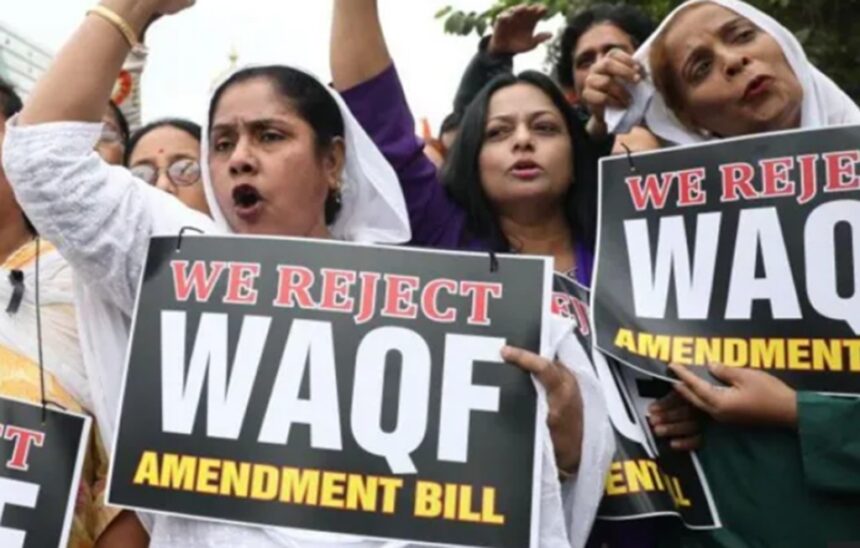NEW DELHI – On Wednesday, India’s lower house of parliament, the Lok Sabha, passed the Waqf Amendment Bill 2025 after a heated 12-hour debate. The government strongly defended the proposed changes, pushing back against opposition claims of undermining constitutional and Muslim rights and eroding federalism.
The bill was approved with 288 votes in favour and 232 against, with support from BJP’s allies helping secure the majority. Home Minister Amit Shah vigorously countered criticism, accusing previous governments of pandering to vote banks and asserting the need for the amendments.
The bill is expected to pass in the Rajya Sabha on Thursday without much difficulty. While the debate in the Lok Sabha echoed the familiar divide between secular and communal viewpoints, the bill’s approval signals another significant move by the BJP.
It follows other controversial legislation like the Citizenship (Amendment) Act, the criminalisation of triple talaq, and steps toward a Uniform Civil Code in Uttarakhand.
This marks the fourth instance where the BJP government has successfully pushed through initiatives despite strong opposition from Muslim organisations and secular parties. Notably, this win came without a full BJP majority, relying instead on support from allies who seem confident in maintaining their electoral base despite potential backlash from Muslim voters.
During the debate, Congress deputy leader Gaurav Gogoi criticised the bill, claiming it undermines the Constitution, targets minorities, and fosters division. Minority Affairs Minister Kiren Rijiju, however, rejected these accusations, arguing the amendments do not interfere with constitutional rights related to religious freedom.
Waqf Amendment Bill 2025: Overview, Changes, and Criticism
The Waqf Amendment Bill 2025, also called the UMEED Bill, introduces new measures to improve the management of Waqf properties in India. It aims to bring more transparency, accountability, and efficiency to the system while addressing longstanding concerns.
Originally presented in 2024, the bill was reviewed by a Joint Parliamentary Committee (JPC) and revised based on public feedback. It was reintroduced in the Lok Sabha on April 2, 2025, under the name UMEED, which stands for Unified Management Empowerment Efficiency and Development.
What Are Waqf Properties?
Waqf refers to properties donated by Muslims for religious, charitable, or private purposes. These properties are considered to belong to God, with their benefits designated for specific causes.
- Creation: Waqf properties can be established through a document, legal instrument, or oral declaration.
- Usage: Properties used for religious or charitable purposes over time can also be recognized as Waqf.
- Irrevocability: Once a property is declared Waqf, it cannot be reclaimed or altered by the donor.
Not all Islamic countries have Waqf systems. For instance, countries like Turkey, Egypt, and Lebanon lack Waqfs. In India, however, Waqf Boards are among the largest urban landowners, managing over 8.7 lakh properties across 9.4 lakh acres, valued at ₹1.2 lakh crore.
Historical Background
The concept of Waqf dates back to the Delhi Sultanate. Sultan Muizuddin Sam Ghaor dedicated two villages to a mosque in Multan and appointed an administrator. The practice grew under various Islamic rulers in India.
- Colonial Era: The British criticized Waqf as “perpetuity of the worst kind,” but the Mussalman Waqf Validating Act of 1913 upheld the system.
- Post-Independence: The Waqf Act of 1954 was introduced to regulate Waqf properties, leading to the establishment of the Central Waqf Council in 1964.
- 1995 Update: The Waqf Act of 1995 strengthened the management of Waqf properties, ensuring they were protected under Islamic law and safeguarded against misuse.
Highlights of the 1995 Waqf Act
The Waqf Act, 1995, governs Waqf properties in India. It established state-level Waqf Boards to oversee these assets. Key provisions include:
- Roles and Responsibilities: Defines the duties of Waqf Boards, the Central Waqf Council, and property caretakers (Mutawallis).
- Waqf Tribunals: Introduced tribunals to handle disputes, functioning with powers similar to civil courts.
- Binding Decisions: Tribunal decisions are final, and civil courts cannot intervene in related disputes.
Key Changes in the Waqf Amendment Bill 2025
The UMEED Bill introduces changes aimed at simplifying processes, ensuring transparency, and addressing challenges.
- Inclusivity: Non-Muslim representatives will be included in central and state Waqf Boards.
- ‘Waqf by User’ Clause Removed: Properties registered as Waqf based on long-term religious use will retain their status unless disputed.
- Section 40 Removed: The Waqf Board can no longer designate any property as Waqf land without clear grounds.
- Separation from Trusts: Trusts created by Muslims will no longer fall under Waqf regulations if governed by other laws.
- Eligibility for Waqf Dedication: Only practising Muslims for at least five years can dedicate property to Waqf.
- Inheritance Protection: Women and children must receive their rightful inheritance before properties are designated as Waqf.
- Limitation Act Applied: Legal disputes involving Waqf properties will now adhere to the Limitation Act, 1963.
- Protection of Tribal Lands: Lands under Schedule V and VI of the Constitution cannot be designated as Waqf.
- Waqf Tribunal Structure: The tribunal will retain a three-member composition as recommended by the JPC.
- Government Property Investigation: Disputes involving government land claimed as Waqf will be reviewed by senior officials.
- Appeals Process: High Courts will now hear appeals against Waqf Tribunal decisions.
- Centralised Portal: Mutawallis must register property details online within six months.
- Financial Reforms: Contributions to Waqf Boards will be reduced from 7% to 5%, allowing more funds for charitable activities.
- Mandatory Audits: Institutions earning over ₹1 lakh annually will undergo audits to ensure transparency.
Why the Bill Matters
The Waqf Amendment Bill 2025 is an important step toward modernising the management of Waqf properties. Its significance lies in:
- Improved Transparency: Better regulations to prevent misuse of properties.
- Streamlined Processes: Use of technology to reduce delays and improve record-keeping.
- Inclusion: Broader representation on Waqf Boards.
- Protection of Rights: Safeguards for women, children, and tribal communities.
Criticism of the Bill
The bill has faced backlash for various reasons:
- Religious Rights: Critics argue it violates the constitutional rights of minorities, particularly Articles 14, 25, 26, and 29.
- Government Overreach: Increased state control is seen as bureaucratic interference.
- Lack of Consultation: Muslim stakeholders were not adequately involved in drafting the bill.
- ‘Waqf by User’ Concerns: Removing this provision may affect properties with undocumented Waqf status.
- Representation Issues: Non-Muslim representatives on Waqf Boards are seen as lacking knowledge of Islamic laws.
- Dispute Resolution: Transferring authority from Waqf Tribunals to district collectors may complicate resolution processes.
The Waqf Amendment Bill 2025 has sparked a debate about balancing modernisation with community rights. While it promises reforms, its long-term impact will depend on how effectively it is implemented.
Related News:
Attacks on Christians in India Continue to Escalate

Geoff Thomas is an award winning journalist known for his sharp insights and no-nonsense reporting style. Over the years he has worked for Reuters and the Canadian Press covering everything from political scandals to human interest stories. He brings a clear and direct approach to his work.














